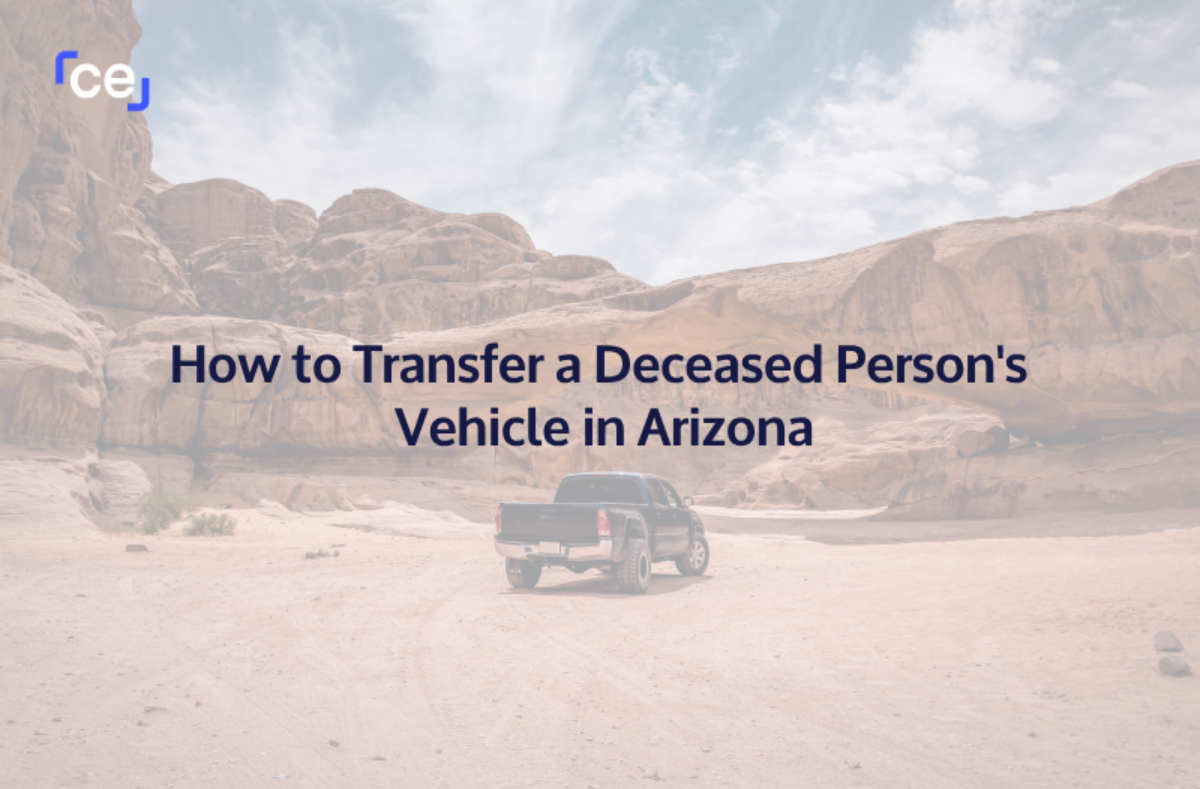Estate Settlement
May 01, 2025
What to Do When Someone Dies in California
Follow this step-by-step guide to navigate legal duties, probate, and estate tasks with clarity and confidence.
Learn the step-by-step process to transfer a deceased person's vehicle in Arizona, including required documents and steps to ensure a smooth transfer.


Making decisions about a deceased loved one’s assets can seem overwhelming. The mental and psychological distress that accompanies losing a loved one can make decisions regarding the disposition of their property difficult. Fortunately, Arizona simplifies the transfer of a vehicle to your name after the original owner's death.
In Arizona, you may be eligible for a simplified transfer process that avoids probate if certain conditions are met:
If these conditions aren't met, or if the vehicle is valued at $50,000 or more, the transfer may need to go through the probate process. Don't worry - we'll guide you through both scenarios in the following sections.
By the end of this guide, you'll have a clear understanding of what steps to take, what documents you'll need, and how to navigate potential challenges in transferring your loved one's vehicle to your name.
The first step is gathering the right documents will ensure the transfer process goes smoothly and takes the shortest time possible. The documents you need in Arizona to transfer the vehicle of a deceased person include the following:
In the Phoenix and Tucson metropolitan areas, a vehicle requires emission testing before the state approves the transfer process. The only exception is if the vehicle is less than five years old, a 1966 model or older, or an electric car.
Before transferring a deceased person’s vehicle, you must determine how they owned it. These details are often indicated in the certificate of title and should direct the transfer method that will be used. If the deceased person owned the vehicle as an individual (sole ownership), the estate planning documents your loved one kept will determine if probate will be necessary to determine the new owner.
If the vehicle was under joint ownership, the title should have a conjunction “or,” which means that the living person in the title is the new and full owner. However, if the conjunction is “and,” the title will go through the administrative process to determine the new owner. Afterward, your name will replace the deceased person’s name in the joint ownership title.
If an individual is named by the owner in the Will as the designated beneficiary, they will automatically inherit the vehicle after their death under Arizona statute A.R.S. 28-2055(B). This provision is called Transfer on Death (TOD), which allows the beneficiary to claim the vehicle without going through the probate process. To designate a beneficiary, the owner would have used the Beneficiary Designation Form (Form 96-0561).
Transfer of vehicle ownership without probate occurs if you own the vehicle under joint ownership with the deceased person or you have the rights of survivorship. These exemptions must be clearly stated in the title or estate planning documents.
Take these steps after confirming ownership:
As you start the transfer process, make sure the vehicle remains insured and later change the insurance policy’s details to include your name.
Transfer of a vehicle through probate occurs when the deceased was the sole owner or was in a tenant-in-common ownership. The following are the steps to take to get the car in your name through probate:
The probate process might take weeks or months before you can be handed over the full rights to the vehicle. You must also be ready to pay the title transfer fees once the probate process ends.
The transfer process of a deceased person's vehicle can come with challenges that need special considerations. For example, if the vehicle had a lien or the original owner was still paying the loan. You must factor these into the transfer process and valuation. If there is a lienholder, the executor should communicate with them to settle the remaining balance. If the deceased person had multiple vehicles, the executor must handle each vehicle separately in determining the new owner. Each vehicle may have a different ownership status or outstanding balance.
Even though the vehicle transfer process is straightforward, you may encounter complex situations requiring an estate professional. An experienced expert can handle these challenges and ensure you remain compliant with Arizona laws. ClearEstate can help you through this process and reduce the emotional burden of dealing with your deceased loved one’s asset transfer process. Book a free consultation today.
 Simplify Probate Today
Simplify Probate Today
Get expert guidance from our specialists who've helped 10,000+ families.
Book a free consultation